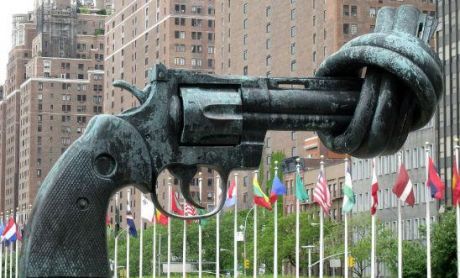News
You are here
Who hasn't signed the Arms Trade Treaty?

July 5, 2013
On June 3, 67 countries signed the Arms Trade Treaty (ATT) to regulate the multibillion-dollar global arms trade. Countries from every region in the world signed the treaty – including France, the United Kingdom, and Germany – three of the world’s major arms exporters. However, the United States and Canada were not amongst those who signed.
The ATT will control the transfer of conventional arms and components and regulate arms brokers, yet it will not control the domestic use of weapons in any country. It also prohibits states from transferring conventional weapons to countries when they know those weapons would be used to commit or facilitate genocide, crimes against humanity or war crimes.
The United States, the world’s largest arms dealer announced it would sign soon. The announcement by US Secretary of State John Kerry that the US will sign is critical, but others have suggested that the treaty’s ultimate strength rests on support by all major arms exporters and importers. Key arms exporters (including Russia, China and Israel) and major importers (including India, Saudi Arabia, Indonesia and Egypt) abstained and have given no indication yet that they will sign it. Many of those weapons have caused grave human rights violations. For instance, in Egypt, arms have been used to attack peaceful protestors. Similarly, the Saudi government has used Western arms (including from Canada) on the crackdown on peaceful protestors in Saudi Arabia and Bahrain.
Canada is not saying whether it will join more than 60 other countries in signing the ATT. The federal government has not decided whether it agrees with the UN’s arms trade treaty, despite having voted to move it ahead in the first place. Foreign Affairs Minister John Baird claimed that “We believe that any treaty regarding the sale of munitions that helps move the international community closer to world-leading standards is a good thing. We participated actively in these discussions. I think we have an obligation to listen before we act, and that is why we will be consulting with Canadians before the government takes any decision”. The Canadian government’s hesitancy may indicate emphasis on an increasingly militarized political agenda.
Section:
Topics:









